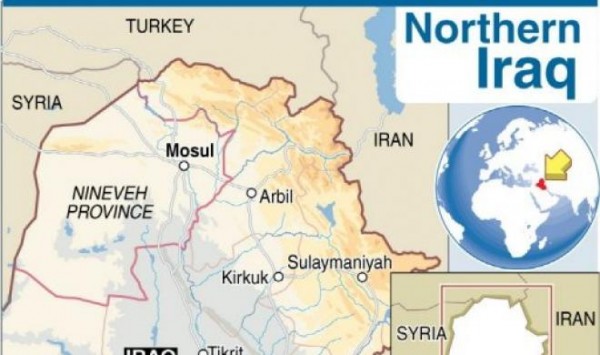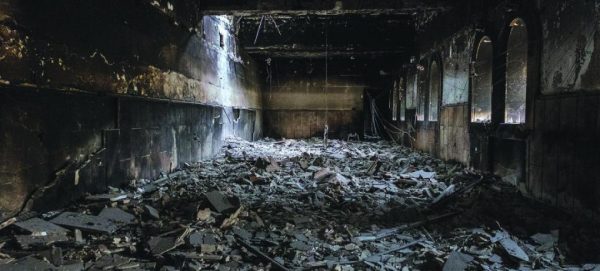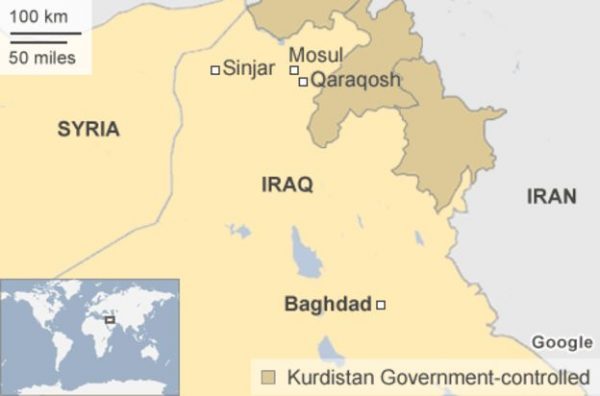
Many Christians refuse to return, despite the liberation of most of the city of Mosul in northern Iraq from the clutches of the Islamic State (IS) preferring to remain in the Kurdistan Region, Baghdad or abroad, for fear of suffering the same fate of displacement and captivity once again.
Chaldean Patriarch of Baghdad Louis Raphael Sako voiced concerns about the Christians’ return June 18, saying in a press statement, “We have security concerns after the liberation of the land.”
On Oct. 28, 2016, Chaldean Archbishop of Erbil Rabban al-Qas said, “Christians prefer staying in Kurdistan rather than returning.” However, over the past few months, several Christian clerics have been calling for the return of Christians to the Ninevah Plains.
According to a field investigation in early 2017, after the liberation of the Ninevah Plains, many Christians were uncertain about going back.
Since 2003, many Christians have left Iraq, which reduced the number of this community inside the country with about 50%, to 1 million.
Qaraqosh was among dozens of towns in northern Iraq that ISIS overran in 2014. Over the past three years, the Iraqi army has regrouped, with the help of Shiite militias, Kurdish forces and American airpower, driving the militants out of all but a few small pockets, such as central Mosul. But while predominantly Muslim towns have begun to rebuild, in Qaraqosh and other mostly Christian places, few residents have returned. Fearing more war and extremism, many worry they never will. “The future in Iraq is full of ambiguity,” says Sabah Petrus Shema who helped his extended family pile into a pickup truck and leave Qaraqosh 3 years ago. He , who now lives in a refugee camp in Erbil. “After ISIS is gone, there may be another group that is even worse.”

The destruction of Qaraqosh was systematic, and everywhere you look, the buildings are charred from flames. ISIS fighters went from home to home, dousing them in chemicals and setting them ablaze. In churches, they smashed religious icons and slashed the faces of paintings of Jesus and Mary. Throughout the town, they left booby traps and improvised explosive devices, some of which remain.
Yousif Yaqoub, the president of the Beth Nahrin National Union, an Assyrian Christian political party, believes the militants wanted to make the town uninhabitable, to send a message to the country’s Christians. “It’s not just in Qaraqosh,” Yaqoub tells Newsweek by phone from Erbil. “In the other Christian towns too, they tried to destroy every single house.”
Given Qaraqosh’s disrepair, it’s understandable that few residents want to return. Yet other Muslim-majority towns suffered worse destruction and have sprung back to life in the months since ISIS fled. Even in Mosul, where fierce fighting continues, once shuttered stores have reopened, and empty neighborhoods are now bustling with people. On a visit to the Wadi Hajar neighborhood of western Mosul in April, just a month after it was recaptured, shopkeepers were repainting their blackened storefronts even as gunfire and explosions erupted a few blocks away.
 Though a few Qaraqosh residents have started trickling back in recent months, the vast majority aren’t. Before the ISIS invasion, 50,000 people lived here. Now, there are only an estimated 180 families. The Christians are concerned over how readily some of their Muslim neighbors accepted the rise of ISIS. “There are still many people who support ISIS,” says a Nineveh Plains Unit member, who identified himself only as Major Latif. The militamen periodically conduct raids to break up sleeper cells in the area.
Though a few Qaraqosh residents have started trickling back in recent months, the vast majority aren’t. Before the ISIS invasion, 50,000 people lived here. Now, there are only an estimated 180 families. The Christians are concerned over how readily some of their Muslim neighbors accepted the rise of ISIS. “There are still many people who support ISIS,” says a Nineveh Plains Unit member, who identified himself only as Major Latif. The militamen periodically conduct raids to break up sleeper cells in the area.
In recent months, ISIS sleeper cells have launched attacks in and around parts of Mosul and Kirkuk, as well as in the capital, Baghdad. “We are afraid of all the people who supported ISIS,” says Shema. “They were brainwashed. Even the children were taught to kill. If security was present, then we could go home. But in Qaraqosh there is no justice, no law to protect us.”
Many Iraqi Christians fear the law will never protect them. ISIS, they feel, is just one of many extremist groups that have threatened non-Muslims since the U.S. toppled Saddam Hussein in 2003. Before the American invasion, there were roughly 1.5 million Christians in Iraq. Since then, their numbers have dwindled to 500,000. Most, such as Shema, are now living in displacement camps in Iraq’s semiautonomous Kurdish region. The conditions are cramped but adequate, in part because the plight of Iraq’s Christians has become a cause for faith-based charities across the world.
Newsweek, Al Monitor

Leave a Reply
You must be logged in to post a comment.